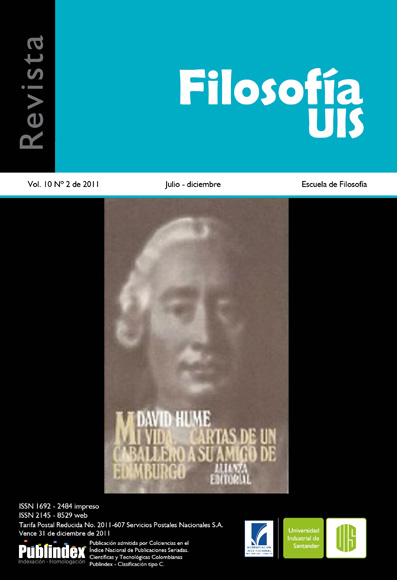Hegel and the bureaucratic foundation of philosophy. The relationship between philosophy and the State in Elements of the Philosophy of Right by Hegel
Published 2011-10-10
Keywords
- Hegel,
- philosophy,
- State,
- bureaucracy,
- Philosophy of Right
How to Cite
Copyright (c) 2011 Eduardo Assalone

This work is licensed under a Creative Commons Attribution 4.0 International License.
Abstract
In this paper we deal with the question of the relationship between the philosophical practice and the State in modernity, according to the conception of G.W.F. Hegel in Elements of the Philosophy of Right (henceforth FR), in order to determine if it is possible to find a “bureaucratic foundation for philosophy” in that work. First, we indicate the immediate precedents of this reflection, by analyzing the positions of Kant and Schelling. Second, we define the concept of a “bureaucratic foundation” in general, and we provide two historical examples taken from the extra-academic field, in one case, and from an academic science, in the other. Then, in an attempt to demonstrate the existence of a bureaucratic foundation for philosophy in FR, by Hegel, we expound the characterizations of philosophy and bureaucracy as a public service according to the author’s point of view. In the Conclusion, we compare both characterizations in order to offer arguments in favor of the existence of an identity between the task of philosophy and public service, both established by Hegel in FR, and finish by concluding that in this work the Prussian philosopher formulates a bureaucratic foundation for philosophy.
Downloads
References
- Assalone, Eduardo (2009a). “La concepción de la burocracia como mediación en la Filosofía del Derecho de Hegel”, En: Slavin, Pablo E., IX Jornadas Nacionales de Filosofía y Ciencia Política, Mar del Plata: Universidad Nacional de Mar del Plata.
- Assalone, Eduardo (2009b). “¿A qué burocracia le teme Hegel? Los mecanismos de control del funcionariado en la Filosofía del Derecho hegeliana”, en: Salerno, Gustavo y Paolicchi, Leandro (editores), Constelaciones éticas. Reflexiones contemporáneas y extemporáneas, Mar del Plata: Suárez.
- Assalone, Eduardo (2010). “Función pública, mediación sociopolítica y burocracia en los Principios de la Filosofía del Derecho de Hegel”, en prensa.
- Balibar, Étienne (2006). La filosofía de Marx, trad. Horacio Pons, Buenos Aires: Nueva Visión.
- Bourdieu, Pierre (1993). “Génesis y estructura del campo burocrático”, En: http://pierre-bourdieu.blogspot.com/2006/07/gnesis-y-estructura-del-campo.html(última visita: 13 de Febrero de 2011).
- Capel, Horacio (1981). Filosofía y ciencia en la geografía contemporánea, Barcelona: Barcanova.
- Carritt, E. F. (1935). Morals and Politics, Oxford: Clarendon Press.
- Carritt, E. F. (1940). “Hegel and Prussianism”, En: Philosophy, Vol. 15, No. 58, April.
- Dotti, Jorge (1983). Dialéctica y Derecho. El proyecto ético-político hegeliano, Buenos Aires: Hacchette.
- Ginzo, Arsenio (1991). “Hegel y el problema de la educación”, En: Hegel, G.W.F., Escritos pedagógicos, trad. Arsenio Ginzo, México: FCE, Introducción.
- Hegel, G.W.F. (1970). Grundlinien der Philosophie des Rechts, en: Hegel, G.W.F., Werke, Band 7, Frankfurt a. M.: Suhrkamp Verlag.
- Hegel, G.W.F. (2004). Principios de la Filosofía del Derecho, Buenos Aires: Sudamericana.
- Kant, Immanuel (1784). “Beantwortung der Frage: Was ist Aufklärung?“, Berlinische Monatsschrift, Dezember-Heft 1784, S. 481-494, En: http://www.uni-potsdam.de/u/philosophie/texte/kant/aufklaer.htm (última visita 13 de Febrero de 2011).
- Kant, Immanuel (2000). “¿Qué es la Ilustración?”, En: Kant, Emmanuel, Filosofía de la historia, México: FCE.
- Kant, Immanuel (2004). El conflicto de las Facultades, Buenos Aires: Losada.
- Knox, T. M. (1996). “Hegel and Prussianism”, En: Stewart, Jon, The Hegel Myths and Legends, Evanston: Northwestern University Press.
- Parente, Diego (2004). “La autoafirmación como gesto retórico-político. Universidad, técnica y filosofía en El conflicto de las facultades”, En: Fernández, Graciela y Parente, Diego (editores), El legado de Immanuel Kant. Actualidad y perspectivas, Mar del Plata: Suárez.
- Rinesi, Eduardo (2007). “El conflicto de las Facultades y la tradición del pensamiento crítico moderno”, En: Rinesi, Eduardo y Soprano, Germán (comps.). Facultades Alteradas: Actualidad de El conflicto de las Facultades, de Immanuel Kant, Buenos Aires: Prometeo-Universidad Nacional de General Sarmiento.
- Ritter, Joachim (1989). “Persona y Propiedad. Un comentario de los §§ 34-81 de los ‘Principios de la Filosofía del Derecho’ de Hegel”, En: Amengual Coll, Gabriel (ed.), Estudios sobre la “Filosofía del Derecho” de Hegel, Madrid: Centro de Estudios Constitucionales.
- Schelling, Friedrich (2008). Lecciones sobre el método de los estudios académicos, Buenos Aires: Losada.
- Villacañas Berlanga, José Luis (2001). La filosofía del idealismo alemán, vol. II, La hegemonía del pensamiento de Hegel, Madrid: Síntesis.
